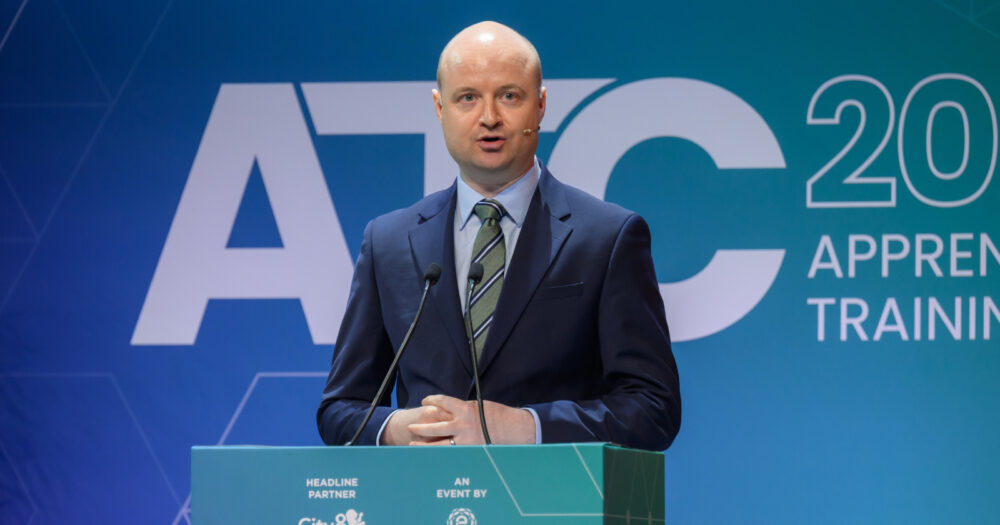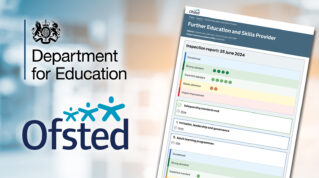As pilots of Ofsted’s new inspection framework begin ahead of full reform rollout on November 10, the inspectorate’s national director of education, Lee Owston, spoke to FE Week senior reporter Josh Mellor about inspection anxiety, transparency, and why the ‘inclusion’ grade is nothing new.
- Do you think Ofsted’s reforms will reduce inspection anxiety?
Inspection exists as part of a wider accountability system, so regardless of how hard we try, we’re not going to be able to remove anxiety that’s associated with an accountability system where, essentially, people are evaluating and then determining an outcome against a team or provider.
However, what we’ve done with this framework is bring in measures to reduce anxiety and to think carefully, not only about the wellbeing and welfare of those that we are inspecting, but also the inspectors.
It’s multi-faceted. I don’t think we’re going to remove anxiety altogether, but we are doing everything within our power to reduce it as far as possible, so your inspection sees providers as they are.
- FE leaders and the independent wellbeing impact assessment have both suggested that inspection-related stress will remain the same, given we’ve got up to 16 graded areas instead of the current 10. Has the framework for FE turned into a bit of a monster?
I don’t think so at all. What we’ve done is made it more transparent and explicit – the different grades that we’re giving to parts of provision, as well as what we think about the provider as a whole. All those decisions were made under the previous education inspection framework, it’s just they didn’t make it to an explicit grade on a report card.
The report card is reporting on the light and shade, with further nuance than we’ve had before, so everybody can see whether it’s learners, their parents or employers themselves where the strengths lie. They can also see where they might need to turn their attention next to continuously improve.
When we introduce something new there will always be an element of anxiety, because it’s different to what has gone before.
- Is there a risk that the sheer volume of information, such as the new toolkits, is overwhelming for providers given the short rollout timeframe you’re working to?
There shouldn’t be anything in the toolkit that people don’t recognise as being part of what makes great FE provision. There is more detail in the toolkit than we had in the handbook previously, but that’s in response to what we heard through the Big Listen, which was that people didn’t understand the descriptors that we had because they were too high level, and there wasn’t any detail to explain what they meant in practice.
We’ve had to use slightly more words than we have in a handbook, but if people look at those words, it should be far more transparent and accessible in terms of what inspectors will be seeking in evidence, and how that then relates to the standards we use to grade them.
- Are you saying that in the long term, providers and Ofsted will be in a better position because there is more clarity? That we’ll face increased anxiety in this period, followed by a longer-term payoff?
I think once we have inspections underway in November, people will see what we’ve put on the page is the reality of what we’ve put into practice.
- Is it a bit late, in terms of the order of events and publication of new framework training for inspectors, if pilots have already started?
This is the traditional way in which we’ve worked. We had test visits, which were testing different methodologies, different versions of the materials, from consultation to launch. And once we’ve published, then we start our piloting process, which is with the finalised methodology.
That gives providers an opportunity to understand how it works in practice, but also gives inspectors an opportunity to get to grips with what it means for them.
Then, of course, we have the inspector training programme in October. We can feed all of that into it, and, in time, that will be published and available to anybody who wants to see it.
- Is the timeline rushed, given that we don’t yet know how the Department for Education’s accountability framework will work, particularly for independent training providers facing high stakes as a result of inspection outcomes?
We exist for learners and young people. It’s about ensuring they get the absolute best, so that’s always first and foremost. And of course, there can be no gap in terms of ensuring that those learners do get what they deserve and need.
However, that doesn’t mean we’re not conscious of the landscape in which leaders and staff are having to work.
I want to make clear that you cannot equate the grades or judgments that went before with the grades we have in this toolkit. We were charged with changing the culture of inspection, and one of the ways we do that is by drawing a line in the sand and having something different to move forward with.
- There are lots of small, independent training providers that deliver higher-level apprenticeships in advanced professional occupations such as accountancy. How would the inclusion criteria be applied in that context?
We shouldn’t be so focused on just SEND or high needs. Yes, they are vitally important, but there are a whole host of other vulnerabilities or barriers to learning and wellbeing that we need to be conscious of.
It is about speaking to the context in which leaders are working, and saying, what are having to support learners with? It could be a family bereavement – obviously you need to take account of that in terms of why somebody might be reacting the way they are in a classroom, or wherever the training is taking place.
We do not want to increase bureaucracy, to introduce all sorts of systems and processes.
- Another question on inclusion – let’s say Ofsted inspects an inner-city general FE college with a lot of disadvantaged learners, and a sixth-form college with a lot of high-attaining level 3 students. Would inclusion apply in the same way to both?
There shouldn’t be any tension between inclusion and achievement. Every institution should have the same opportunity to be graded as ‘expected standard’, ‘strong’ or ‘exceptional’, regardless of the context.
Some institutions will have more challenges than others, but every provider will have challenges of some sort, and that’s why inspection is trying to get underneath their context so we can understand it and factor it into the evidence we collect.
Inclusion was in the last framework. We’ve just shone a brighter spotlight on it.
















Your thoughts